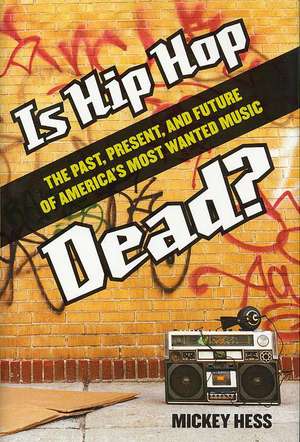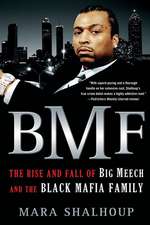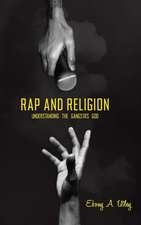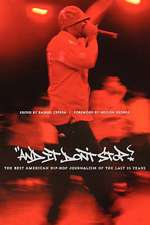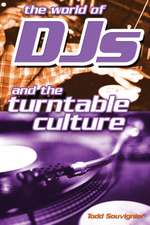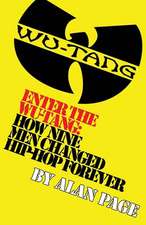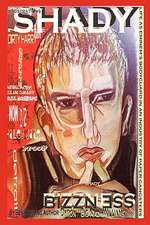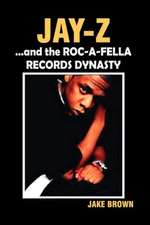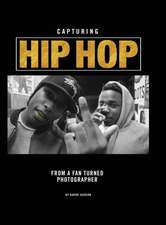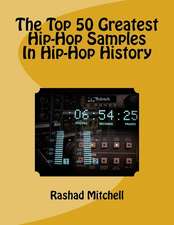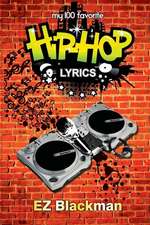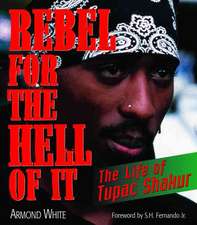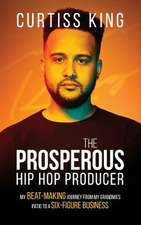Is Hip Hop Dead?: The Past, Present, and Future of America's Most Wanted Music
Autor Mickey Hessen Limba Engleză Hardback – 29 aug 2007 – vârsta până la 17 ani
Preț: 286.80 lei
Preț vechi: 415.16 lei
-31% Nou
Puncte Express: 430
Preț estimativ în valută:
54.89€ • 57.09$ • 45.31£
54.89€ • 57.09$ • 45.31£
Carte tipărită la comandă
Livrare economică 14-28 aprilie
Preluare comenzi: 021 569.72.76
Specificații
ISBN-13: 9780275994617
ISBN-10: 0275994619
Pagini: 208
Dimensiuni: 156 x 235 x 22 mm
Greutate: 0.46 kg
Editura: Bloomsbury Publishing
Colecția Praeger
Locul publicării:New York, United States
ISBN-10: 0275994619
Pagini: 208
Dimensiuni: 156 x 235 x 22 mm
Greutate: 0.46 kg
Editura: Bloomsbury Publishing
Colecția Praeger
Locul publicării:New York, United States
Notă biografică
Mickey Hess is Assistant Professor of English at Rider University, and the editor of Greenwood Press's Icons of Hip Hop: An Encyclopedia of the Movement, Music, and Culture.
Recenzii
Hess believes that the foundations of the lyrics of the music, which initially told stories about the artists as well as about their culture and environments, are disappearing. He offers a social and historical timeline of the music genre..The author reviews artists' biographies, marketing- and media- driven personas, and the scenarios that glorify violence and misogyny via offensive lyrics and videos. Capitalism and commercialism have affected the fabric of the music, but it is not dead yet. Notes and a historical biography supplement the text. Recommended for college collections and anyone studying the history of rap music.
Any college-level library strong in contemporary music culture needs Is Hip Hop Dead?, sure to be a popular library lead.
When rapper Nas released his 2006 album Hip Hop is Dead, he became yet one more voice warning that excessive commercialism had killed off the vitality of the music. Hess (English, Rider U.) explores the relative validity of these fears through analysis of issues of authenticity as expressed in the lyrics of rap artists. Over the course of the discussion, he discusses how the artists represent their career paths and their roles in the music industry, complications of hip hop's basis in autobiography in the lyrical personas of such artists as Digital Underground and MF DOOM, the ways white artists such as an Eminem frame their autobiographies within the model of hip hop authenticity, and the role of parody in confronting racial stereotypes related to social privilege.
Any college-level library strong in contemporary music culture needs Is Hip Hop Dead?, sure to be a popular library lead.
When rapper Nas released his 2006 album Hip Hop is Dead, he became yet one more voice warning that excessive commercialism had killed off the vitality of the music. Hess (English, Rider U.) explores the relative validity of these fears through analysis of issues of authenticity as expressed in the lyrics of rap artists. Over the course of the discussion, he discusses how the artists represent their career paths and their roles in the music industry, complications of hip hop's basis in autobiography in the lyrical personas of such artists as Digital Underground and MF DOOM, the ways white artists such as an Eminem frame their autobiographies within the model of hip hop authenticity, and the role of parody in confronting racial stereotypes related to social privilege.
